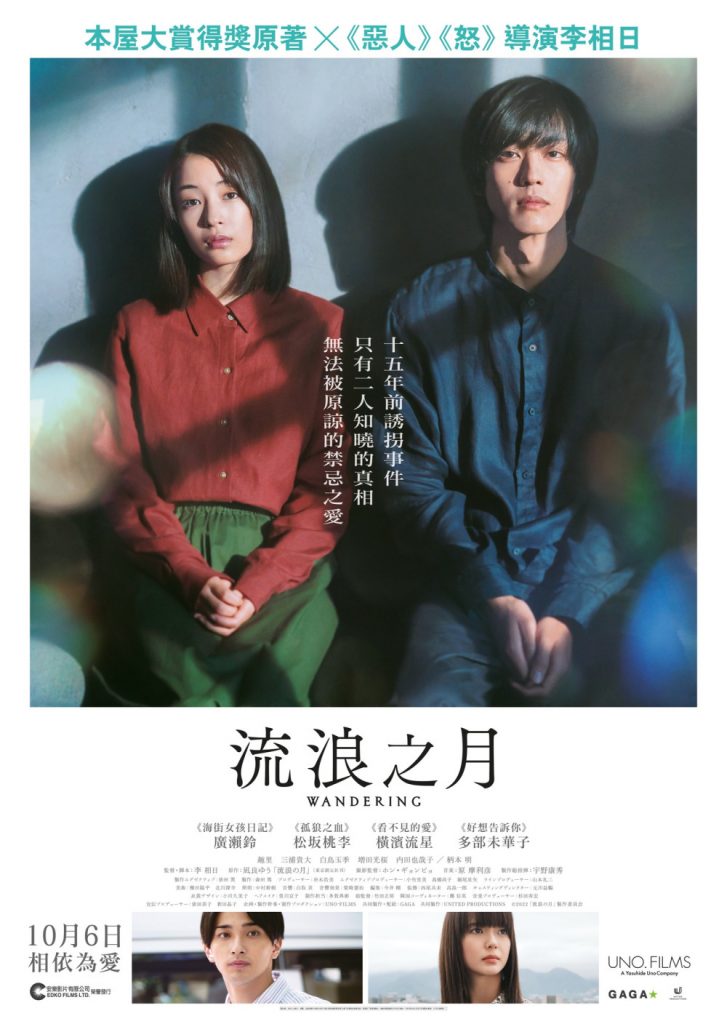I love arthouse movies. They got me thinking long after I left the movie theater, reminiscing scene after scene. The synopsis of Wandering (or The Wandering Moon) captured my attention.
In a park on a rainy evening, a 19-year-old university student, Fumi, offers an umbrella to a soaking wet 10-year-old girl, Sarasa. Realizing her reluctance to go home, Fumi lets her stay in his place, where she spends the next two months in peace. They take each other’s hands and seem to have finally found their place in the world until Fumi is arrested for kidnapping. Fifteen years later, the lonely two are reunited both still suffering from the stigma as the victim and perpetrator of “a pedophile case”. Will society give a place to the unshakable bond they have formed?

The male leading character Fumi is played by Tori Matsuzaka while the 9 and 24-year-old female leading characters Sarasa are played by Tamaki Shiratori and Suzu Hirose respectively. All three are great actors. Fumi is struggling with a secret that he vows to take to his grave. A perpetually constrained personality with rare bursts of emotion at crucial story-defining moments. On the topic of “pedophiles”, every movement, every word, and every thought of Fumi is being scrutinized by the audience. You can see him struggling throughout 150 mins of the movie duration. As an audience, I was constantly being asked to evaluate: is he or is he not a pedophile?
The young Sarasa wants to live freely. She yarns for that. She too carries a secret that she reveals to Fumi during her two months of stay at his apartment. The older Sarasa wants to move on with her life and her past and just live the life that people expect her to live. Marry a decent man, start a family, earn a living, and stay happy.
15 years later, both have their respective relationships but neither is happy. The timeline of young and older Sarasa juxtaposed against each other, throughout the entire movie, as the scriptwriter carefully explains the story while working with the audience to jointly arrive at a conclusion.
What a beautiful plot.
Spoiler-free writeup end here, be warned!
There are some afterthoughts. And yes, it has spoilers.
- I like how Fumi explains to a young girl that he doesn’t like grown women (but does not admit that he likes young girls). And Fumi doesn’t admit to his ex-girlfriend that he doesn’t like grown women. Instead in a rare outburst, he admits that he likes young girls. I still don’t think he meant it in a pedophile way when he said he liked young girls. I believe that he wanted his ex-girlfriend to have closure (like admitting that he ‘used’ her, which I don’t think is entirely true).
- I like how the scriptwriter introduces Ryo – a domestic violent man – as Fumi’s boyfriend. That is a massive contrast between Fumi who has never laid a finger on Sarasa versus Ryo who has beaten Sarasa very violently. Who is the abuser? To whom is the victim?
- I like how the two timelines almost mirror to one another – event by event.
- Fumi tells Sasara, “Never let others own your life. You are the owner of your life.” I love that.
- And Fumi never runs away from Sasara. That emotional moment by the beach with them holding hands.
- I love how as an audience, I went from “he is not a pedophile, is he?” to “OK, he may like young girls” to “Uh oh, he is a pedophile so what’s next” to finally, “Ah, that’s why we thought he is a pedophile”. That ending of revealing Fumi’s secret is priceless.
- The ending also explains the title of the movie, which is so good. What if the community does not accept us? Just keep wandering elsewhere.
- Can love transcend sex? This story says love can.
One reply on “Wandering (2022) – A Japanese Arthouse Movie So Good / My Afterthoughts”
The way he touched little Sasara’s lips makes you think that he has a lolita complex. What left me wondering is whether he avoided feeling sexual attraction because of his genital condition, he felt repulsive. Or because he treasures the purity of little girls and took his feelings to a kind of seeing, admiring but not touching, like when we are looking at a work of art.